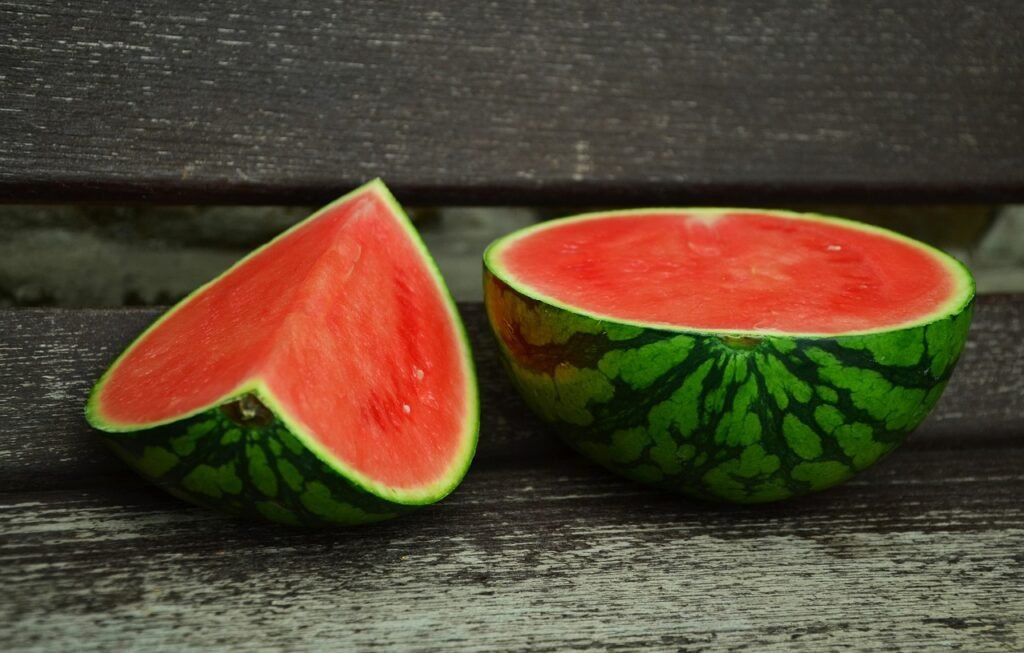Watermelon, with its juicy sweetness and hydrating properties, is a quintessential summer fruit enjoyed by many. As you savor its refreshing taste, you may wonder, can dogs eat watermelon too? In this detailed guide, we’ll explore the safety, benefits, and potential risks of dogs consuming watermelon.

Understanding Watermelon:
Watermelon (Citrullus lanatus) is a popular fruit known for its high water content, vibrant color, and delightful flavor. It consists of juicy flesh, seeds, and a thick rind. While humans primarily consume the flesh, both the flesh and rind are potential options for dogs.
Can Dogs Eat Watermelon?
Yes, dogs can eat watermelon in moderation. The fruit itself is non-toxic to dogs and can offer various health benefits when served appropriately.
Nutritional Value:
Watermelon is packed with essential nutrients beneficial for both humans and dogs, including:
- Water: With its high water content, watermelon helps keep dogs hydrated, especially during hot weather.
- Vitamins: Watermelon contains vitamins A, B6, and C, which contribute to overall health and immune function in dogs.
- Minerals: Potassium and magnesium found in watermelon support nerve function and muscle health in dogs.
- Antioxidants: Watermelon contains antioxidants such as lycopene, which may help protect cells from damage.
Benefits of Watermelon for Dogs:
- Hydration: The water content in watermelon can help keep your dog hydrated, particularly on hot days or after physical activity.
- Low in Calories: Watermelon is relatively low in calories, making it a suitable treat option for dogs watching their weight.
- Rich in Fiber: The fiber in watermelon aids digestion and can help regulate bowel movements in dogs, promoting gastrointestinal health.
- Nutrient Boost: Watermelon provides essential vitamins and minerals that contribute to overall well-being in dogs.
Risks and Precautions:
While watermelon can be a safe and healthy treat for dogs, there are some considerations to keep in mind:
- Choking Hazard: Dogs should not consume watermelon seeds or large pieces of the rind, as they can pose a choking hazard or cause intestinal blockages.
- Digestive Upset: Introducing new foods into a dog’s diet can sometimes lead to digestive upset, including diarrhea or vomiting. Start with small amounts of watermelon and monitor your dog’s reaction.
- Sugar Content: Although watermelon is low in calories, it contains natural sugars. Excessive consumption may lead to weight gain or blood sugar issues in dogs with diabetes or obesity.
- Pesticides and Chemicals: Opt for organic watermelon to avoid exposing your dog to harmful pesticides or chemicals. Wash the fruit thoroughly before serving.
How to Serve Watermelon to Dogs:
When offering watermelon to your dog, follow these guidelines for safe consumption:
- Remove Seeds: Remove seeds and cut the watermelon into small, bite-sized pieces to prevent choking hazards.
- Monitor Intake: Offer watermelon as an occasional treat and incorporate it into your dog’s balanced diet in moderation.
- Supervise: Always supervise your dog while they eat watermelon to ensure they are chewing properly and not experiencing any adverse reactions.
- Introduce Gradually: Introduce watermelon gradually into your dog’s diet to assess tolerance and prevent digestive issues.
Conclusion:
In conclusion, dogs can safely enjoy watermelon as a refreshing and nutritious treat, provided it is served responsibly. With its hydrating properties, fiber content, and array of vitamins and minerals, watermelon can be a beneficial addition to your dog’s diet when served in moderation and with precautions in mind.
As with any new food, it’s essential to monitor your dog’s response and consult with your veterinarian if you have any concerns or questions. By following these guidelines, you can share the joy of watermelon with your furry friend while promoting their health and well-being. I hope you get answer of Can Dogs Eat Watermelon.
Remember, the key is moderation and mindful feeding practices to ensure a happy and healthy relationship with this summertime delight!
